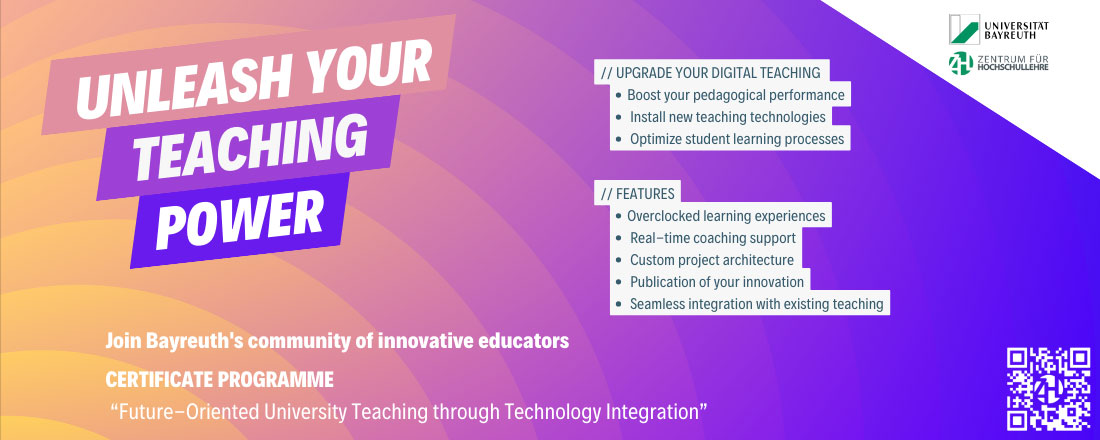Certificate programme “Future-Oriented University Teaching through Technology Integration”
This program enables all teachers at the University of Bayreuth to participate in a certified, structured, and individually tailored professional development and coaching program. It includes phases of self-reflection (guided by a digital questionnaire), 1:1 consultations, input on a wide range of teaching technology topics, and the design, implementation, and evaluation of a teaching project with technology integration.
Summary of the program
Do you feel that your teaching is not yet truly future-oriented and that you are not aware of and taking advantage of all the digital possibilities for supporting the learning processes of students? Then the Bayreuth-specific certificate program “Future-Oriented University Teaching through Technology Integration” is perfect for you. The program aims to serve as a guide for future-oriented university teaching and consists of the following three main components:
- Individual professional development in the areas of university didactics and technology integration in teaching in the form of consultations, attending workshops, online learning material and optional exchange meetings with colleagues
- The development, implementation and evaluation of your own teaching project with a focus on the integration of selected technologies to create competence-oriented teaching
- The publication of a Scholarship of Learning and Teaching publication or a digital teaching project poster
The certificate program has a minimum of 60 working units, depending on the scope of the personal teaching project. Here you see examples of possible teaching projects:

Upon successful completion, participants will receive the university teaching certificate “Future-Oriented University Teaching through Technology Integration” comprising at least 60 working units. This certificate is an exclusive offer for teaching staff at the University of Bayreuth, and will be offered from the summer semester of 2024 as the successor to the certificate program “Promoting teaching and learning processes with digital resources”.
Aim of the certificate program
At the end of the certificate program, participants will have designed, implemented, evaluated, and published an individual teaching project with digital resources, including a didactic rationale, and expanded their own knowledge and skills in dealing with digital teaching-learning formats, methods, and technologies. The program is aimed at two target groups. Please click on your correspondence to display your goals:
- For teaching beginners Hide
-
- Developing didactic skills in the use of digital tools in teaching:
- Expanding one's own knowledge and applying basic didactic concepts to plan and implement courses that take into account digital tools and technologies in order to design courses that are up-to-date and skills-oriented.
- Identifying suitable digital methods and media to support the learning process of students.
- Expanding one's own knowledge and applying basic didactic concepts to plan and implement courses that take into account digital tools and technologies in order to design courses that are up-to-date and skills-oriented.
- Further developing one's own teaching:
- Design and implementation of a teaching project with digital components.
- Inclusion of feedback from colleagues, university didactics experts and students for future teaching design.
- Critical reflection on one's own teaching practice and identification of potential for improvement.
- Publication of findings as Scholarship of Learning and Teaching or other format.
- Peer exchange:
- Participation in peer exchange activities to reflect on and improve one's own teaching practice.
- Giving and receiving constructive feedback for the continuous development of teaching skills.
- Developing didactic skills in the use of digital tools in teaching:
- For lecturers who want to take their teaching to the next levelHide
-
- Expansion of one's own didactic competence in dealing with digital tools in teaching for a future-oriented teaching design:
- Expansion of one's own knowledge of digital and virtual methods and media for teaching in order to develop personally innovative teaching concepts that support the learning process of students in a competence-oriented way.
- Identification of suitable digital methods and media for one's own teaching in face-to-face/online or blended learning formats.
- Evaluating the use of digital methods and media in teaching and deriving optimization possibilities.
- Further developing one's own teaching:
- Designing and implementing one's own teaching project with digital components and, in connection with this, applying digital tools to design courses.
- Continuously revise and improve one's own teaching practice based on feedback from a university didactics perspective, personal reflection and student evaluation results.
- Publish the findings as a scholarship of learning and teaching or in another format.
- Participate in teaching networks to jointly develop and discuss innovative teaching concepts.
- Expansion of one's own didactic competence in dealing with digital tools in teaching for a future-oriented teaching design:
Procedure
Individual start, registration possible at any time via the following link: https://profilehreplus.de/seminare/zertifikatsprogramm-zukunftsorientierte-hochschullehre-durch-technologieintegration-mit-insg-60-ae-dil-1

Below you will find a list of the individual components of the certificate program. Click on the links to open further information.
- Self-study material on the topic of “Technology integration in higher education” Hide
-
This asynchronously provided material is divided into several individual topics, which are processed according to interest and the intended teaching project. During the first conversation, you will receive an individual plan for processing the contents as part of the certification program. The following topics are offered:
- Technology integration to provide asynchronous teaching and learning materials: Digital media such as videos, podcasts, blogs, interactive charts, 360° scenarios or 3D models can be used as teaching and learning materials to provide learners with information and support them in developing content. These materials can be used in both synchronous and asynchronous phases.
- Technology integration to promote collaborative learning activities: Digital media facilitate communication and collaboration between teachers and students as well as among students themselves. These include, among others, chat-based exchange platforms, video conferencing and jointly editable online documents such as Cryptpad, Miro or Padlet.
- Technology integration to design interactive learning activities: Digital media can enable interactive learning activities, e.g. through quizzes, simulations, virtual lab exercises and H5P elements in learning management systems. These interactive elements promote active learning and student participation.
- Technology integration to create individualized learning paths for students: By using digital media, learning processes can be adapted to the individual needs of students and aligned with competencies. Adaptive learning platforms, the use of AI and personalized learning environments are examples of such possibilities.
- Integrating technology to enable feedback and evaluations: Digital media can be used to provide feedback and evaluate learning progress. This can be done through online tests, AI-supported evaluation systems, peer reviews and feedback tools.
- Gamification and game-based learning methods in teaching: Gamification can be used to incorporate learning games or quizzes into teaching to convey content in a fun way. The well-thought-out use of points systems and rewards can also boost student motivation. Gamified teaching is possible, for example, by integrating gamification elements into learning platforms.
- E-portfolios for reflection and self-evaluation in teaching: E-portfolios can be used to document student learning progress and to encourage reflection on personal development. Another possibility is to use peer feedback and self-evaluation routines to promote students' metacognition.
- OER materials in teaching: Open Educational Resources in higher education are still a rare phenomenon in Germany. However, such materials can be used and further processed practically in one's own teaching.
- Personalized learning portfolioHide
-
A digital learning portfolio that guides you individually through the certificate program and in which you already write down relevant content for publication. In addition, it reflects your own developmental progress.
- Teaching projectHide
-
During the certificate program, you will develop a personal teaching project with the support of university didactics. This is designed on the basis of self-learning content and consultation sessions, then implemented in your own teaching and finally evaluated using feedback from students and, if applicable, colleagues, and your own reflection. The teaching project is published at the end of the certificate program as a SOTL or digital poster.
- Exchange phases, internships and one-to-one consultations Hide
-
In addition to individual consultations with a university didactics employee, exchange phases with colleagues are organized. This provides feedback on one's own ideas and considerations. During the implementation of the teaching projects, classroom observations are carried out, and colleagues can also observe your teaching project.
- University didactics seminars Hide
-
In addition to the self-study material, seminars selected by the participants themselves are attended as part of the certificate program. These workshops focus on digital media and technologies in teaching and are listed on the website profilehreplus.de with the reference [DiL]. The range of seminars offered changes every semester and seminars from other Bavarian universities can also be attended.

